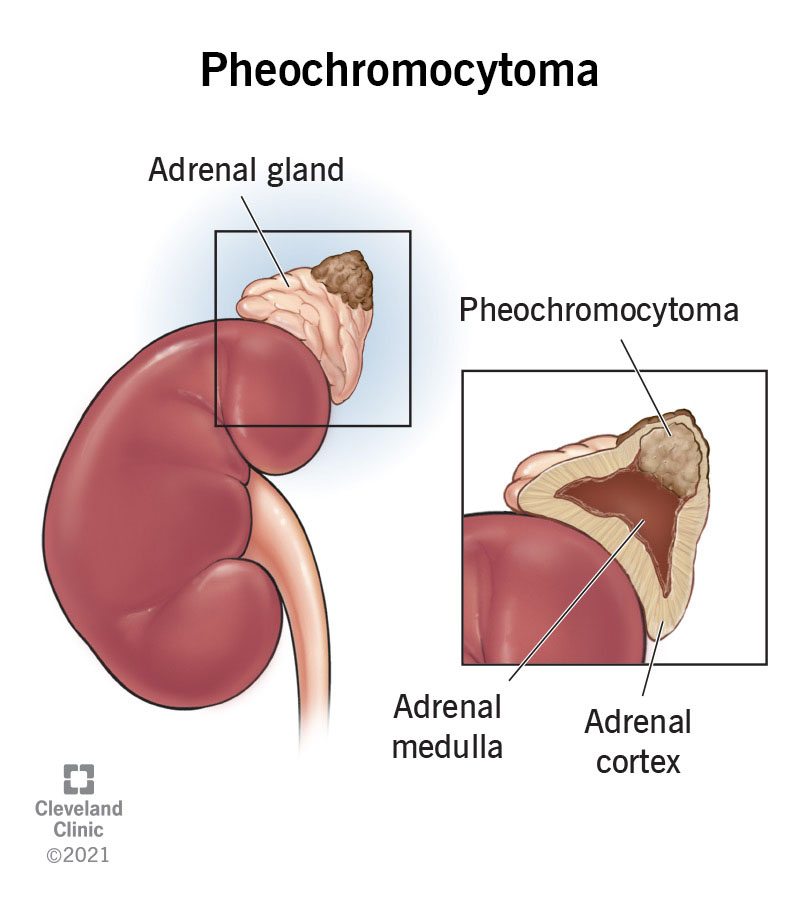A patient with pheochromocytoma
is admitted to the hospital with severe hypertension. Which nursing intervention is the highest priority?
Administering an alpha-adrenergic blocker as prescribed.
Administering intravenous fluids to maintain hydration.
Monitoring blood glucose levels every 4 hours.
Preparing the patient for immediate surgery to remove the tumor.
The Correct Answer is A
Choice A Reason:
Administering an alpha-adrenergic blocker is the highest priority intervention for a patient with pheochromocytoma and severe hypertension. Pheochromocytoma causes excessive secretion of catecholamines, leading to severe hypertension. Alpha-adrenergic blockers help to control blood pressure by blocking the effects of these catecholamines, thereby reducing vasoconstriction and lowering blood pressure. This intervention is crucial to prevent hypertensive crises and associated complications such as stroke or myocardial infarction.
Choice B Reason:
Administering intravenous fluids to maintain hydration is important but not the highest priority. While maintaining hydration is essential, it does not directly address the severe hypertension caused by pheochromocytoma. Intravenous fluids can help support overall patient stability but do not specifically target the underlying cause of the hypertension.
Choice C Reason:
Monitoring blood glucose levels every 4 hours is a necessary intervention, especially since pheochromocytoma can cause hyperglycemia due to increased catecholamine levels. However, this intervention is not the highest priority compared to controlling the severe hypertension, which poses a more immediate threat to the patient’s health.
Choice D Reason:
Preparing the patient for immediate surgery to remove the tumor is a critical step in the long-term management of pheochromocytoma. However, surgery is not typically performed until the patient’s blood pressure is stabilized with medications such as alpha-adrenergic blockers. Therefore, while surgery is essential, it is not the immediate priority in the acute management of severe hypertension.

Nursing Test Bank
Naxlex Comprehensive Predictor Exams
Related Questions
Correct Answer is D
Explanation
Choice A Reason:
Recommending cleaning the ear with cotton swabs daily is not appropriate for managing otitis externa. Using cotton swabs can further irritate the ear canal, potentially worsening the inflammation and increasing the risk of infection. It is generally advised to avoid inserting anything into the ear canal to prevent damage and irritation.
Choice B Reason:
Advising the patient to use over-the-counter ear drops is not the best initial intervention. While some over-the-counter ear drops may provide temporary relief, they are not as effective as prescription topical antibiotics and corticosteroids in treating the underlying infection and inflammation associated with otitis externa. Proper medical treatment is necessary to ensure effective management of the condition.
Choice C Reason:
Administering oral antibiotics is not typically the first-line treatment for uncomplicated otitis externa. Oral antibiotics are reserved for cases where the infection has spread beyond the ear canal or in patients with risk factors for severe infection. Topical antibiotics and corticosteroids are preferred for their direct action on the affected area and fewer systemic side effects.
Choice D Reason:
Administering topical antibiotics and corticosteroids is the most appropriate initial intervention for otitis externa. Topical treatments effectively target the infection and reduce inflammation, providing relief from symptoms such as pain, itching, and discharge. This approach is supported by clinical guidelines and is considered the standard of care for managing otitis externa.
Correct Answer is B
Explanation
Choice A Reason:
Adrenal hyperplasia involves the enlargement of the adrenal glands, which can lead to an overproduction of adrenal hormones. However, it does not directly cause hyperpituitarism. Hyperpituitarism is related to the overactivity of the pituitary gland, not the adrenal glands.
Choice B Reason:
Pituitary adenoma is the most common cause of hyperpituitarism. These benign tumors in the pituitary gland lead to the overproduction of one or more pituitary hormones, causing symptoms such as severe headaches, visual disturbances, and joint pain. The pituitary gland’s overactivity due to the adenoma results in the excessive release of hormones, which can affect various bodily functions.
Choice C Reason:
Thyroid carcinoma is a type of cancer that affects the thyroid gland While it can cause hormonal imbalances, it does not typically lead to hyperpituitarism. The symptoms described are more consistent with a pituitary-related issue rather than a thyroid condition.
Choice D Reason:
Hypothalamic dysfunction can affect the pituitary gland’s function since the hypothalamus regulates pituitary hormone release. However, it is less likely to be the primary cause of hyperpituitarism compared to a pituitary adenoma. The direct overproduction of hormones by the pituitary gland is more commonly due to an adenoma.
Whether you are a student looking to ace your exams or a practicing nurse seeking to enhance your expertise , our nursing education contents will empower you with the confidence and competence to make a difference in the lives of patients and become a respected leader in the healthcare field.
Visit Naxlex, invest in your future and unlock endless possibilities with our unparalleled nursing education contents today
Report Wrong Answer on the Current Question
Do you disagree with the answer? If yes, what is your expected answer? Explain.
Kindly be descriptive with the issue you are facing.
